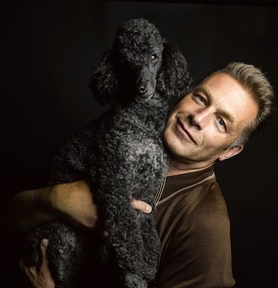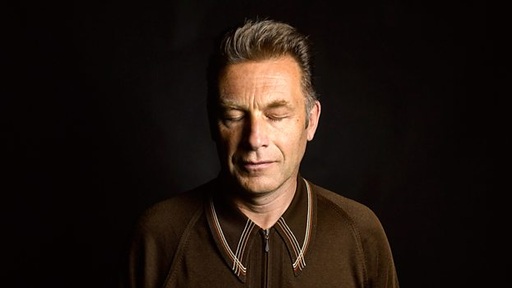Chris Packham - Asperger's and Me: 'People find me weird which is why I live in a wood'
Wildlife TV presenter, Chris Packham, has spent 30 years on the TV “trying to act normal”. Now he has decided to bare all in an extremely candid documentary, revealing what it is like living with autism.

It wasn’t until he was in his 40s that he was diagnosed with Asperger’s. Up till then he did his best to fit in, trying to say the ‘right’ things and not offend anyone.
During his school years, the world was a very dark place where he was subjected to taunts and insults from his peers, leaving him bewildered as to why he was being picked on and excluded. However while his teenage years were often miserable, they were also the time when he was happiest in his life.
In the documentary which aired on BBC2 last night, Chris, who presents Springwatch, reveals how he reared a kestrel from a chick and formed a strong bond with the bird.
He trained it to fly to him and says when he was flying his kestrel, it was the happiest he had ever been in his life. The kestrel only lived for six months and he said: “I have never loved anything as intensely. It was perfect every day for six months until the end. I only connected with what is buried in the ground and when that didn’t exist it was catastrophic.”
When talking about the bird on the documentary, he looks visibly pained and reveals that for years he would still go back every year to visit the kestrel’s grave in the field where he used to fly. “As a child, when I got into things, I really got into them.”
Punk music saved me
In his teenage years, growing up in Southampton, he credits punk music with saving him, saying: “It sounded how I felt.”
When asked on camera if he had ever attempted suicide, he admits to thinking about it “very seriously” about “three times in my life”.
It was his relationship with his dogs that stopped him as "they loved me and I couldn’t let them down".
'I love Scratchy more than anything else'
He is hugely reliant on his poodle Scratchy who lives with him in his cottage in a wood in the New Forest and he admits: “I love Scratchy more than anything else in the world”.
For Chris, relationships with animals are more straightforward and simpler and he says: “Human relationships because of their complexity can make you unhappy”.
Chris does have a long-term partner who he has been with for 10 years but they don’t live together. Charlotte Corney, owner of Isle of Wight Zoo, describes him as as sometimes “like an alien” and admits it is “hard to deal with his lack of empathy”.
Going out with an autistic person can mean that due to social situations being challenging, normal everyday couple activities are often a problem.
“I have a friend’s wedding coming up but I haven’t even mentioned it to him as I know he wouldn’t want to come,” says Charlotte.
'I will never be bored' with Chris
However she accepts him as he is, saying: “He is fascinating. There is a lifetime guarantee with Chris that I will never be bored.”
He feels “very lucky to have found someone who puts up with my social failings”.
In the TV documentary, he travels to the US to look at ‘treatments’ for autism. He finds people are being given TMS – Transcranial Magnetic Stimulation, where parts of the brain are stimulated to change the way brain cells function.
He also visits a school where they are using Applied Behaviour Analysis which works by changing autistic behaviour through making the child repeat ‘normal’ behaviour again and again.
The treatment makes him very uncomfortable and he is glad it has been “largely rejected in the UK for making autistic children into something they are not”.
Simple solution is 'to be on my own'
Chris says he has a simple solution to the call for therapy and that is “to be on my own”. In the documentary, he is keen to show the positive side of being autistic and he meets Steve Silberman who has written extensively about the contribution autistic people have made to the tech industry such as Google, Apple and Microsoft.
“Before the tech industry, they would have been considered weird people but now they are running the world,” he says.
This desire to change autistic people and ‘normalise’ them is because “it is easier to change the individual rather than society,” says Steve Silberman.
Chris feel he has benefited from being autistic, experiencing the world in a very different way, with heightened senses that at times are overwhelming, and a mind that is constantly bouncing from one subject to the next. When he walks in the woods, he hears “layers of bird songs” and he is very conscious of sights and smells.
He believes being “able to see things and hear things that most people can’t is a gift”.
After school Chris went to university to study zoology. “When I left university, I was virtually unemployable but my sister said why don’t you go on TV and talk about animals. I had something my peers didn’t. I had a vast encyclopaedic knowledge of the natural world.”

It was then he started his career as a presenter with spikey blonde hair, on The Really Wild Show. “I realise now there is no way I could do these shows without autism.”
It seems Chris at the age of 56 has come to terms with being who he is. He realises social situations are not for him and hasn’t been to a party for 10 years, saying: “I suspect people find me a little bit weird which is why I choose to live in a wood”.
However there is one thing he hasn’t learnt to deal with and “that is losing the things I love most”. His dog Itchy died earlier this year which left him traumatized and he is unable to directly talk about it in the documentary. Now his remaining dog Scratchy has liver disease and Chris worries about being left “hopelessly alone”.
The end of the documentary shows his step daughter Megan who he describes as "one of the most important people" in his life, asking him to come to her graduation. He says of course he isn’t coming, just to see her be given a piece of paper.
To him “it is not a big deal”. To her “it is”.
Asperger’s and Me succeeds in showing “we need to understand autistic people better not change the way they are”.
Latest Features News
 25-Nov-19
2019 Election: Boris Johnson leaves social care in 'too difficult box' but Labour vows to end 'crisis'
25-Nov-19
2019 Election: Boris Johnson leaves social care in 'too difficult box' but Labour vows to end 'crisis'
 18-Oct-19
Podcast: Wendy Mitchell and dementia: 'My biggest fear is not knowing who my daughters are'
18-Oct-19
Podcast: Wendy Mitchell and dementia: 'My biggest fear is not knowing who my daughters are'
 27-Sep-19
Exclusive: Care minister backs care workers' call for time off to grieve and attend funerals
27-Sep-19
Exclusive: Care minister backs care workers' call for time off to grieve and attend funerals
 19-Sep-19
Podcast: Gyles Brandreth says poetry helps ward off dementia
19-Sep-19
Podcast: Gyles Brandreth says poetry helps ward off dementia
 30-Aug-19
Edinburgh Fringe funnyman joins comics facing toughest audience at care home gig
30-Aug-19
Edinburgh Fringe funnyman joins comics facing toughest audience at care home gig